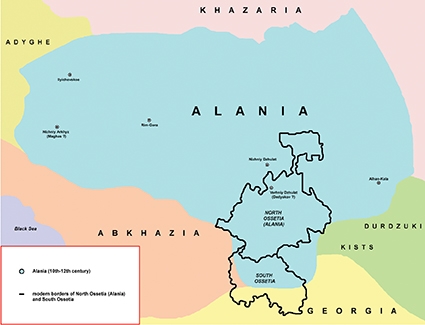The Great Alania
OP-ED
Occupied South Ossetia is waiting for another referendum. While many fled the territory following the ethnic cleansing, the population currently residing there must now decide whether they want the name of the Republic of South Ossetia to be changed to the ‘Republic of South Ossetia-Alania’. The so-called President Leonid Tibilov has already signed the Referendum decree and it will be held on April 9 along with the so-called Presidential elections.
Naming the occupied territory ‘South Ossetia-Alania’ is a longtime dream of the separatists, a term historically mentioned a quarter-century ago, in the very first days of the conflict, when the separatist leaders announced the “Holy War” against Official Tbilisi in the name of the revival of the “Great Alania”. Notably, the Autonomous Republic of North Ossetia, which is part of the Russian Federation, has been called the Republic of North Ossetia–Alania since 1994. The so-called “Great Alania” is all about the unification of the South and North Ossetias, as well as being directed towards joining the Russian Federation.
In the occupied South Ossetia, as well as in North Ossetia, the scheduled referendum is considered a prospect for the establishment of the United Republic of Alania as an integral part of the Russian Federation. Despite such accord, in reality there are quite earthly intentions hiding behind the publicized “Great Goal” of the referendum.
On April 9, the so-called Presidential elections will be held together with the referendum. Allegedly, the de-facto President Tibilov will be running against the main creator of the 2008 August War – Eduard Kokoity. The latter, and his supporters, are categorically against giving up what they gained during the August War. Therefore, they desperately oppose joining the Russian Federation and the proposal of renaming South Ossetia.
Kokoity’s participation in the so-called elections has yet to be confirmed, but surrendering independence to Russia has a great number of opponents. They say in Tskhinvali that appointing the referendum is a PR stunt designed to gain votes and in reality has nothing to do with the notion of Great Alania. Correspondent of Echo of Caucasus, Zhana Tarkhanova, disagrees, writing that though some might believe the referendum to be a publicity stunt, in fact this idea has quite a lot of supporters in both South and North Ossetia.
Despite the power struggle inside the de facto regime, Official Tbilisi has responded to the initiative of changing the name of the occupied territory through the referendum. Prime Minister Kvirikashvili hailed it another step towards Russia’s annexation of Ossetia. “This referendum once again reveals the real intentions of the occupational power, which is to turn Georgia’s inseparable regions into its own integral part. According to international law, holding a referendum in a region which is effectively controlled by occupational powers and from which tens of thousands of locals have fled as a result of ethnic cleansing is illegal and completely unacceptable,” read the Prime Minister’s announcement.
The oppositional parties also believe that the so-called referendum is backed by Moscow rather than Tskhinvali. Paata Davitaia, the head of European Democrats, believes that adding the name Alania to occupied South Ossetia is an attempt to unify it with North Ossetia. He adds that the situation in South Ossetia differs from that of Abkhazian and that the population is in favor of unification with the Russian Federation. “Unlike Abkhazians, local Ossetians favor joining Russia. However, Russia has itself refrained from holding a referendum on South Ossetia joining Russia, because the business is not settled in Abkhazia yet. Therefore, the issue of Alania is a new scheme planned against Georgia, which focuses on changing the name in the first place and later on unification. Let’s see how things develop,” says Paata Davitaia.
Zaza Jgarkava












